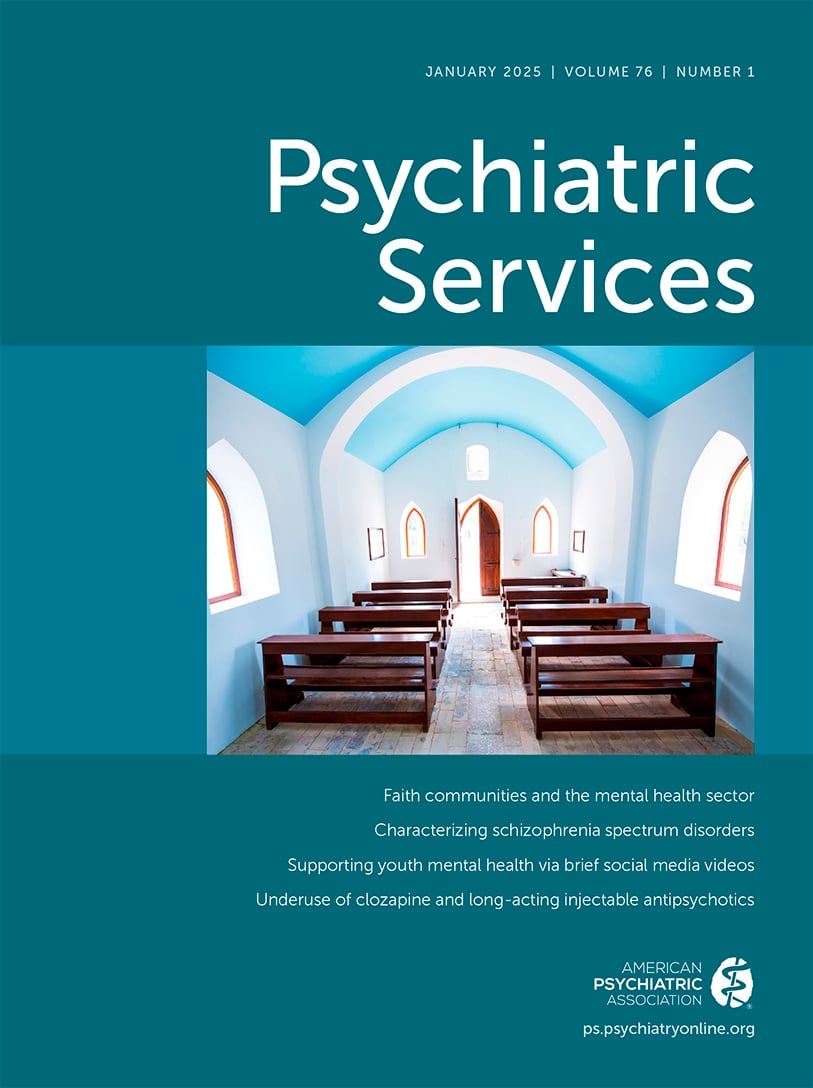Psychiatric Services
- Volume 53
- Number 3
- March 2002
Taking Issue
Departments
Columns
Publication date: 01 March 2002
Pages255–257Introduction by the column editors: Numerous factors influence a patient's decision to accept or reject prescribed medications, including the patient's personal values, environmental conditions, and the quality of the patient-physician relationship (). ...
https://doi.org/10.1176/appi.ps.53.3.255Departments
Columns
Other Articles
Publication date: 01 March 2002
Pages281–287There is widespread interest throughout the mental health system in routine quality assessment to facilitate quality improvement, oversight, purchasing, and consumer choice. In the absence of agreement on a limited number of meaningful and feasible ...
https://doi.org/10.1176/appi.ps.53.3.281Publication date: 01 March 2002
Pages288–292One consequence of the longer interval between major revisions of the DSM(from seven years between DSM-III-R and DSM-IV to more than 15 years between DSM-IV and DSM-V) is that the accompanying descriptive text will become increasingly out of step with the ...
https://doi.org/10.1176/appi.ps.53.3.288Publication date: 01 March 2002
Pages293–298OBJECTIVE: The service use patterns and health status outcomes of Medicaid recipients with severe mental illness in a system that assigned full financial risk to managed care organizations through capitation and a system that paid for mental health care ...
https://doi.org/10.1176/appi.ps.53.3.293Publication date: 01 March 2002
Pages299–303OBJECTIVE: The relationship between financial risk arrangements, access to services, and consumer satisfaction with services was assessed in a sample of Medicaid beneficiaries who were enrolled under three different financial risk arrangements for health ...
https://doi.org/10.1176/appi.ps.53.3.299Publication date: 01 March 2002
Pages304–309OBJECTIVE: This study assessed the relationship between the outcomes of clients of client-run self-help agencies and attendance at the agency, satisfaction with the agency, psychological disability, and organizationally mediated empowerment, that is, the ...
https://doi.org/10.1176/appi.ps.53.3.304Publication date: 01 March 2002
Pages310–316OBJECTIVE: The authors examined the associations between attendance at self-help meetings, adherence to psychiatric medication regimens, and mental health outcomes among members of a 12-step self-help organization specifically designed for persons with ...
https://doi.org/10.1176/appi.ps.53.3.310Publication date: 01 March 2002
Pages317–325OBJECTIVE: This study examined the lifetime use of alcohol, drug, and mental health treatment services by recently incarcerated women prison inmates. METHODS: A total of 805 women entering a North Carolina prison for new felony charges in 1991 and 1992 ...
https://doi.org/10.1176/appi.ps.53.3.317Publication date: 01 March 2002
Pages326–331OBJECTIVE: Most scales that measure the ability of consumers with severe mental illness to function in community settings are designed to be completed by case managers or other clinicians. The objective of this study was to develop an instrument that ...
https://doi.org/10.1176/appi.ps.53.3.326Brief Report
Publication date: 01 March 2002
Pages332–334National trends in firearm-related suicides among African-American and white males in the age groups 15 to 19 years and 20 to 24 years from 1979 to 1997 were examined. The rates and percentages of suicide by firearms increased significantly more among ...
https://doi.org/10.1176/appi.ps.53.3.332Publication date: 01 March 2002
Pages335–336A cohort of 102 psychiatric outpatients with major depressive disorder were followed up for about two years. Prospective ratings were obtained at each medication management visit with two instruments that measured changes in symptoms. The mean time to ...
https://doi.org/10.1176/appi.ps.53.3.335Publication date: 01 March 2002
Pages337–339The authors examined gaps in the use of antipsychotic medications during the one-year period after discharge in an epidemiological sample of 189 first-admission patients with schizophrenia between July 1989 and January 1996. Sixty-three percent of the ...
https://doi.org/10.1176/appi.ps.53.3.337Publication date: 01 March 2002
Pages340–342The authors studied the utility of the DSM-IV Global Assessment of Functioning (GAF) scale for improving interdisciplinary communication about patient care. Discharge GAF scores for 165 discharged inpatients were computer generated by 13 trained unit ...
https://doi.org/10.1176/appi.ps.53.3.340Publication date: 01 March 2002
Pages342–344Recent reports suggest that a symptomatic state that is often prodromal to schizophrenia can be identified prospectively. We examined treatment-seeking histories and psychiatric services received among patients with a syndrome similar to a prodromal ...
https://doi.org/10.1176/appi.ps.53.3.342Letters
Book Reviews
News & Notes
Past Issues
View Issues Archive
Vol. 76 | No. 1

Vol. 75 | No. 12

Vol. 75 | No. 11
